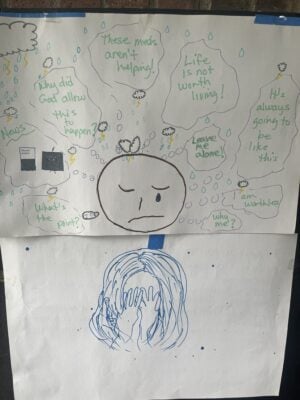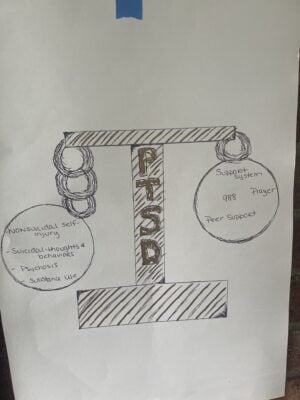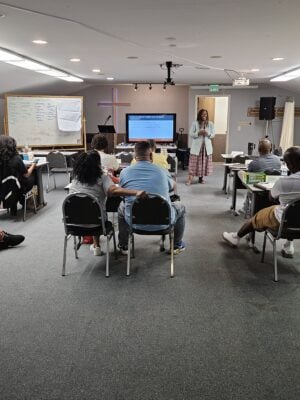As demand for mental health support continues to grow in Indianapolis, the Sandra Eskenazi Mental Health Center is offering free Mental Health First Aid certification training.
The program, known as the Mental Health Toolkit, is designed to equip people in workplaces, schools, faith communities and other organizations with the tools to recognize mental health and substance use challenges and intervene before a situation becomes a crisis.
Ti’Gre McNear, a training facilitator with the center, said the program is modeled after CPR but for mental and emotional emergencies.
“Mental health first aid is the help that’s offered to individuals who support people who may be experiencing a mental health challenge or a substance-use challenge,” McNear said. “We want to be the bridge, or the gap, between someone experiencing a challenge and getting professional help.”

The training, which provides a three-year certification through the National Council for Mental Wellbeing, is built around a five-step action plan called ALGEE: assess for risk, listen without judgment, give reassurance and information, encourage professional help and encourage self-help strategies. Each step is meant to guide someone through identifying symptoms, creating a safe space for dialogue and offering clear next steps and resources.
McNear said it’s not only about knowing how to respond in the moment; it’s about normalizing conversations around mental health.
“Our ultimate goal is to decrease stigma so people can speak up and get the help they need,” she said.
The program, which began in 2023, has already certified more than 3,200 individuals, with a goal of reaching 3,500 by the end of September, when the adult-focused portion of the grant is set to expire. Youth mental health training will continue for another two and a half years.
The classes are offered for free to organizations with at least five staff members, though McNear said they won’t turn anyone away.

“We’ll train two or three people. They’ve shown up and we don’t turn them away,” she said. “We train them because if one person enjoys the training and they go back and tell another organization, then the word gets out.”
To make the training accessible, the team offers flexible scheduling, including sessions on Saturdays, and hosts classes twice a month at the Assessment and Intervention Center through Eventbrite in two-part sessions from 5:30-9 p.m.
Feedback from participants has been overwhelmingly positive.
McNear shared comments from individuals like Ashante Simmons, a public safety officer at IU Health, who said the class encouraged her to build on her training. Others, including leaders from local churches and nonprofits, described learning more about supporting those around them, not just in their professional roles, but also in how they support loved ones at home.

The Mental Health Toolkit also includes physical resources to support wellness long after the training ends. These toolkits contain items such as kinetic sand, essential oils, and stretch bands, along with printed materials and resource lists.
“We want to sustain the training beyond just certification,” McNear said.
In addition to McNear, trainings are facilitated by Lisa Hoffman and Tracy Pruitt, with separate tracks offered for those working with youth. For organizations interested in hosting a session, McNear encourages reaching out directly via email or phone. Contact details include:
- General inquiries: toolkit@eskenazihealth.edu
- Ti’Gre McNear: Tigre.McNear@EskenaziHealth.edu
- Lisa Hoffman: Lisa.Hoffman2@EskenaziHealth.edu
- Tracy Pruitt (youth training): Tracy.Pruitt@EskenaziHealth.edu
- Phone: 317-927-5581
“We want people to understand that mental health doesn’t always mean mental illness or sickness,” McNear said. “It means taking care of yourself daily so you have tools in place.”
As the September deadline approaches, McNear and the team are urging community organizations, especially those in underserved areas, to take advantage of the training while it’s still funded.
To learn more about mental health first aid, visit mentalhealthfirstaid.org.
This reporting is made possible by a grant from the Indianapolis African-American Quality of Life Initiative, empowering our community with essential health insights. https://iaaqli.org/
Contact Health & Environmental Reporter Hanna Rauworth at 317-762-7854 or follow her on Instagram at @hanna.rauworth.
Hanna Rauworth is the Health & Environmental Reporter for the Indianapolis Recorder Newspaper, where she covers topics at the intersection of public health, environmental issues, and community impact. With a commitment to storytelling that informs and empowers, she strives to highlight the challenges and solutions shaping the well-being of Indianapolis residents.








